Video Podcasts of Freiburger Horizonte Events
THE FRIAS WEBSITE HAS MOVED. YOU CAN ACCESS CURRENT INFORMATION AT THE NEW DOMAIN: HTTPS://UNI-FREIBURG.DE/FRIAS/
|
The spread of right-wing extremism and populism, the Russian invasion of Ukraine and the escalation of the Gaza conflict all point to an intensification of social conflicts. In this context, we often speak about a threat to democracy. Some universities are being called upon to take a stance in these social conflicts. At the same time, some researchers who have done so came under pressure, as the “funding affair” surrounding Minister of Education and Research Bettina-Stark Watzinger in spring 2024 showed. Thus, should universities position themselves more strongly? JunProf.in Dr. Amrei Bahr, Junior Professor of Philosophy of Technology & Information at the University of Stuttgart and co-founder of the higher education policy initiative #ichbinhanna, explores the relationships between universities, researchers and politics in her lecture and places current debates in the context of fundamental ethical and scientific-theoretical considerations. |
|
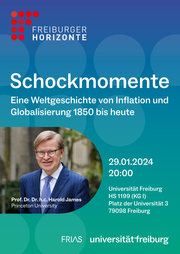 |
How do major economic crises arise and what can we learn from them? Economic historian Prof. Dr. Dr. h.c. Harold James from Princeton University in the US has spent his research life intensively studying the history of globalization. In his new book "Seven Crashes" (German: "Schockmomente"), James takes a close look at the major economic crises since the 19th century and analyzes what we can learn from them for the future. In his lecture, Harold James takes the current crises of globalization as the starting point for his look at recent history and examines the plausibility of the end-time fantasies circulating against this backdrop. He comes to the conclusion that we only learn from major crises. |
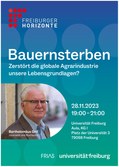 |
The images of factory farming, vast acreages used for monocultures and tonnes of food being thrown away have long been part of our collective consciousness. At the same time, they are an expression of the global triumph of industrial agriculture, which former SPIEGEL Africa correspondent Bartholomäus Grill retraces in his book "Bauernsterben" (Siedler Verlag), published in November 2023. On November 28, 2023, Grill presented some of the theses of his book and discussed them with the audience. Grill reported on his travels to emerging countries, such as Brazil, where the deforestation of the rainforest is defended as a "right to prosperity" with reference to Western societies. For Grill, agriculture as part of society faces a difficult question: how can food be produced in an ecologically sustainable way in the future without jeopardizing social and political stability through sharply rising prices? |
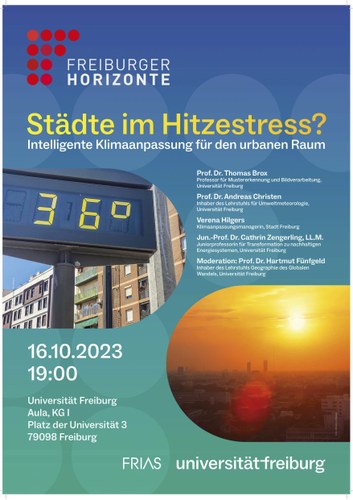 |
Urban areas will be particularly affected by climate change. How can cities prepare for climate change? Representatives from the fields of computer science, law and geography as well as the climate adaptation manager from the city of Freiburg discussed how artificial intelligence can help us prevent heat stress. They also shed light on the new legal challenges for municipalities and citizens, as well as the difficulties and resistance that politicians will face when it comes to implementing protective measures against the increasing heat. |
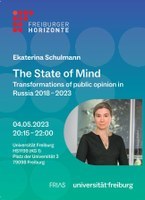 |
What does the Russian population think? The intensifying repressions by the Russian regime make it increasingly difficult to obtain free information about the opinions and moods of Russians. |
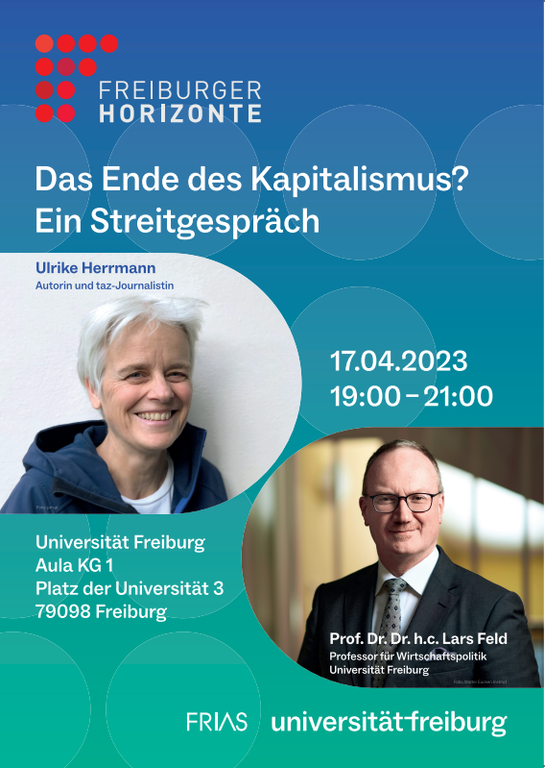 |
Freiburger Horizonte on 17 April 2023: The End of Capitalism? A debate Rationing, reducing, cutting back – concerns about the energy supply and the consequences of the high energy prices dominated the public discourse in Germany during the winter of 2022/23. This period of uncertainty coincided with the publication of the book "Das Ende des Kapitalismus" ("The End of Capitalism") by author and taz journalist and Ulrike Herrmann, which quickly became a bestseller. Will the climate crisis force us to question the system we live in? Are capitalism, green growth and carbon neutrality irreconcilable? And can we "green shrink" the economy without endagering our democracy? Ulrike Herrmann and Lars Feld, Professor of Economic Policy at the University of Freiburg debated these questions as part of the "Freiburger Horizonte". |
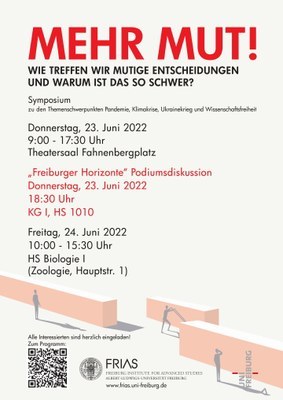 |
As part of the symposium "More Courage" organised by FRIAS, journalist Ullrich Fichtner, former Baden-Württemberg Finance Minister Edith Sitzmann, climate activist Jule Pehnt and forest ecologist Prof. Dr. Klaus Püttmann discussed lack of courage and the basics of courageous decisions. |
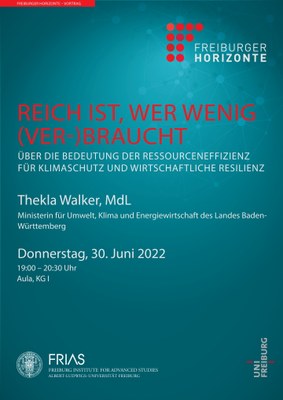 |
Freiburger Horizonte on 9 June 2022: On the importance of resource efficiency for climate protection and economic resilience
At the invitation of FRIAS, Prof. em. Dr. Hans von Storch, meteorologist and former head of the Institute for Coastal Research at the Helmholtz Centre Geesthacht, spoke about various climate models and their areas of application and significance. Based on a topology of models, von Storch discussed what kind of knowledge the different models generate. |
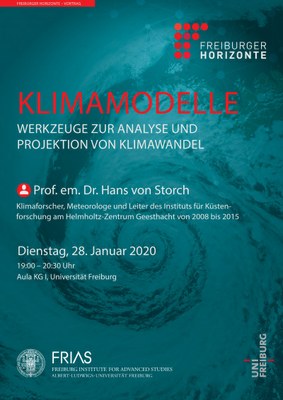 |
At the invitation of FRIAS, Prof. em. Dr. Hans von Storch, meteorologist and former head of the Institute for Coastal Research at the Helmholtz Centre Geesthacht, spoke about various climate models and their areas of application and significance. Based on a topology of models, von Storch discussed what kind of knowledge the different models generate. |
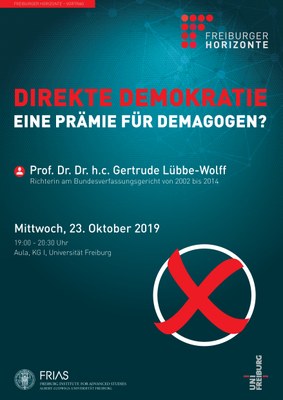 |
Freiburger Horizonte on 23 October 2019: Direct Democracy - A Bonus for Demagogues? Public lecture given by Prof. Dr. Gertrude Lübbe-Wolff, jurist and judge at Constitutional Court from 2002 until 2014. |
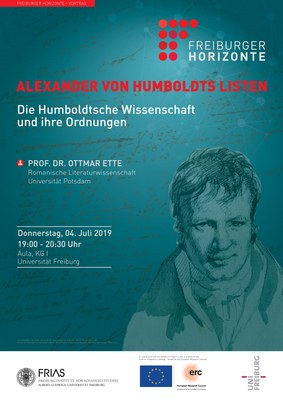 |
Public lecture given by Prof. Dr. Ottmar Ette, Professor of Romance Literary Studies at the University of Potsdam. |
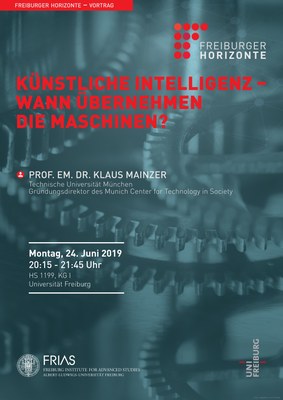 |
Freiburger Horizonte on 24 June 2019: "Artificial Intelligence – When will Machines take over? Public lecture given by Prof. em. Dr. Klaus Mainzer, founding director of the Munich Center for Technology in Society (MCTS) and TUM Emeritus of Excellence since 2016. |
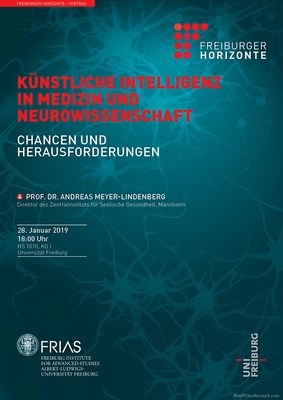 |
Freiburger Horizonte on 28 January 2019: "Artificial Intelligence in Medicine and Neuroscience - Opportunities and Challenges" Public lecture given by Prof. Dr. Andreas Meyer-Lindenberg, director of the Central Institute of Mental Health (Zentralinstitut für Seelische Gesundheit Mannheim). |
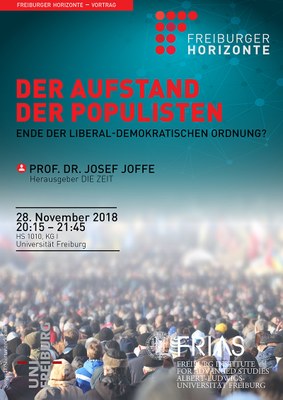 |
Public lecture given by Prof. Dr. Josef Joffe, the publisher of the weekly newspaper Die ZEIT. |
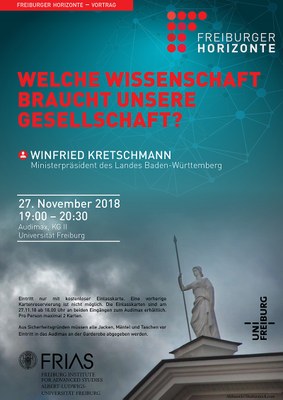 |
Freiburger Horizonte on 27 November 2018: "What kind of science does society need?" Public lecture given by Winfried Kretschmann, the prime minister of the state of Baden-Württemberg. |
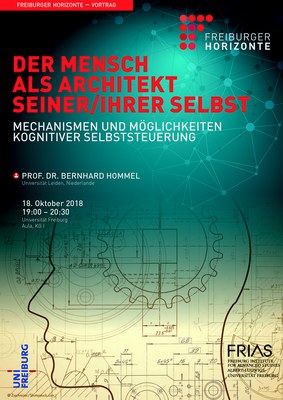 |
Freiburger Horizonte on 18 October 2018: "The human being as architect of his/her self. Mechanisms and possibilities of cognitive self-control." Public lecture given by Prof. Bernhard Hommel (Psychology, Leiden University). |
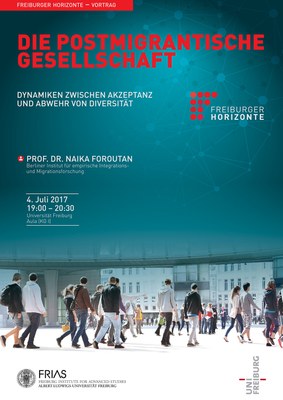 |
The post-migrant society - dynamics between acceptance and rejection of diversity Public lecture by Prof. Naika Foroutan, Migration Scholar at the Berliner Institut für empirische Integrations- |
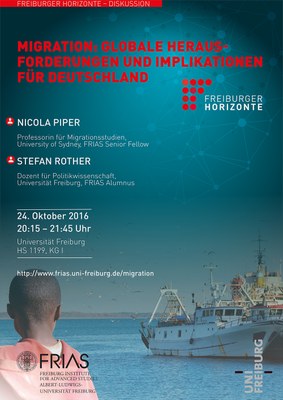 |
Freiburger Horizonte on 24 October 2016: "Migration: Global challenges and implications for Germany" Public lecture by FRIAS Fellow Nicola Piper (Migration Studies, University of Sydney) and FRIAS Alumnus Stefan Rother (Political Science, University of Freiburg). |
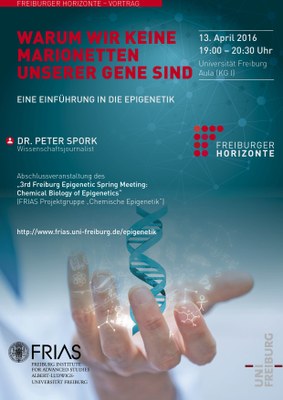 |
Public lecture by Dr. Peter Spork. The science journalist is author of various books, among them the bestseller „Der zweite Code – Epigenetik oder wie wir unser Erbgut steuern können“. Concluding presentation of the 3rd Freiburg Epigenetic Spring Meeting |
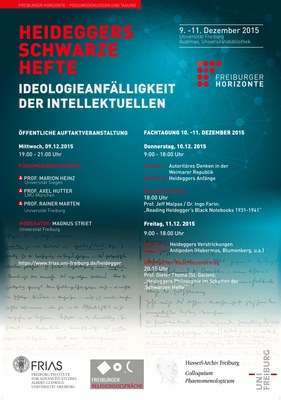 |
Panel discussion (in German) Opening panel discussion, in cooperation with the Freiburger Religionsgespräche and the Colloquium Phaenomenologicum, Husserl-Archive Freiburg Moderator Magnus Striet, Professor for Fundamental Theology at the University of Freiburg Participants Prof. Marion Heinz, Professor for Theoretical Philosophy at the University of Siegen Prof. Rainer Marten, Professor for Philosophy at the University of Freiburg Prof. Axel Hutter, Professor for Philosophy at the LMU Munich |
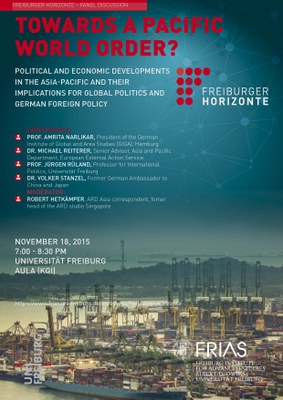 |
Freiburger Horizonte on 18 November 2015: "Towards a Pacific World Order?" Political and economic developments in the Asia-Pacific and their implications for global politics and German foreign policy Panel discussion (in English) The discussion focussed on the political and economic development in East and Southeast Asia and its implications for the rest of the world. From an economic viewpoint, the region already represents almost 60% of the worldwide gross domestic product. Similarly, the region is increasingly gaining importance concerning politico-security aspects. Moderator: Robert Hetkämper, long standing ARD East and Southeast Asia correspondent and fomer head of the ARD television studio in Singapore Participants: Prof. Amrita Narlikar, President of the German Institute of Global and Area Studies (GIGA), Hamburg Dr. Volker Stanzel, former German Ambassador to China and Japan Dr. Michael Reiterer, Senior Advisor, Asia and Pacific Department, European External Action Service Prof. Jürgen Rüland, Professor for International Politics at the Universität Freiburg and long standing expert for Southeast Asia |
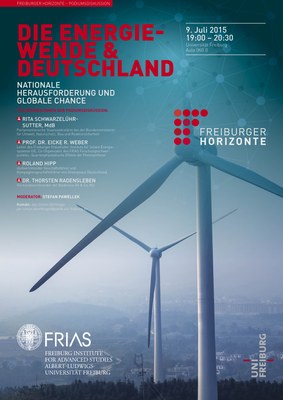 |
Freiburger Horizonte on 9 July 2015: "Germany and the Energy Transition - National Challenge and Global Opportunity" Panel discussion (in German) Participants: Rita Schwarzelühr-Sutter, Parliamentary State Secretary at the Federal Ministry for the Environment, Nature Conservation and Nuclear Safety, Member of Parliament Prof. Dr. Eicke R. Weber, Head of the Fraunhofer Institute for Solar Energy Systems in Freiburg ISE, Co-Organiser of the FRIAS Research Focus „Designed Quantum Transport in Complex Materials“ Roland Hipp, Deputy CEO and Campaign Manager at Greenpeace Germany Dr. Thorsten Radensleben, Executive Chairman of the Badenova AG & Co. KG |
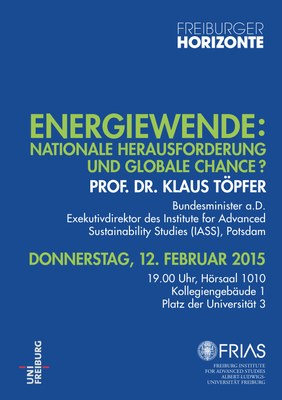 |
Public lecture (in German) by the former Federal Minister and Executive Director of the United Nations Environment Programme Prof. Dr. Dr. Klaus Töpfer. |

